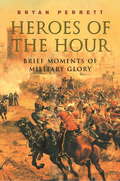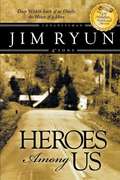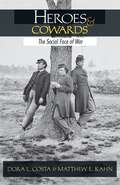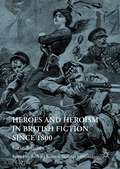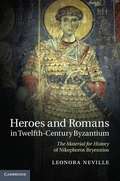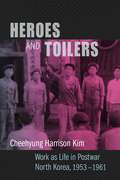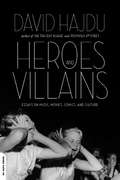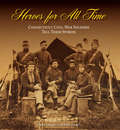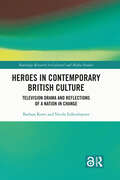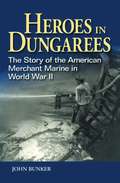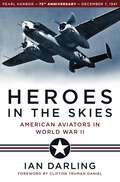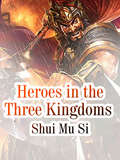- Table View
- List View
Heroes Don't Run
by Harry Mazer"I wanted to serve, to be a part of this thing my father had given his life for. I didn't want the war to end, and all I'd be able to say was, No I didn't serve, I was right here the whole war, safe in Bakersfield." Adam Pelko witnessed the Japanese attack on Pearl Harbor that killed his father, a lieutenant on the USS Arizona. Even though Adam is underage, he defies his mother's wishes and enlists in the Marines. sent first to boot camp, then to Okinawa, he experiences the stark reality of war firsthand -- the camaraderie and the glory as well as the grueling regime, the paralyzing fear, and death. And at every turn, Adam must confront memories of his father. In the concluding volume of his World War II trilogy, Harry Mazer masterfully illustrates Adam's journey as he navigates brutal circumstances that no boy should know.
Heroes Next Door: Hornet 24
by Chris PelusoWritten to help address the dearth of age appropriate material focusing on the Vietnam conflict, Heroes Next Door – Hornet 24 gives the middle school and young adult reader a window into the lives of helicopter pilots during that conflict. The book is written with attention to detail, the reader experiences basic training, flight school, and twelve months of life, service, and sacrifice in Vietnam as told by a veteran who lives next door. Matt and Ellie are growing up in an average suburban area, when their next-door shows up with an olive-drab painted Army helicopter. The machinery sparks immediate interest and serves as a conduit to relationship building between the two children and their neighbor, Mr. Ed. Spread over nearly two years the siblings help restore the vintage aircraft and gradually, Mr. Ed shares stories of his training and experiences during the 1960s. Stories from Basic Training gives the reader a sense of the discipline and focus required. Flight training introduces the reader to some of the principles of helicopter flight and performance. Readers travel the globe, landing in Southeast Asia just after the Tet Offensive. The risk, fears, apprehensions, and personal development that come with such a deployment, along with the emotional growth, team building, and camaraderie weave into a series of combat action sequences. The reader is left with a basic understanding of the history of the conflict (thru late 1969), how U.S. and South Vietnamese troops engaged and searched for the communist forces, and how helicopters provided maneuverability and flexibility to the U.S. forces. Along the way, the reader is shown life in a large Army camp, Saigon, and the risks associated with assignment to Vietnam. Heroes Next Door-Hornet 24 also shows some of the lighter side of the conflict, rest and rehab in Bangkok, recreation in camp, team building, and a few current events. It also takes a brief look at the anti-war movement and how it affected the soldiers who were doing their duty. Heroes Next Door -Hornet 24 is a unique book that reveals the humanity and the horrors of the Vietnam War in a manner that is appropriate for younger audiences. With attention to historical accuracy and touching respect for the men and women of the Vietnam War, this book is a must-have companion for any young reader looking for real-life heroes.
Heroes Of The Hour
by Bryan PerrettThirteen true tales of men who were briefly military heroes of their time, but have since been largely forgottenThis book looks back to the time when an individual could change the course of history in a single battle or engagement, and yet still be forgotten. Here are the stories of the men who were regarded as heroes at the time but have now been forgotten or eclipsed. Some were honourable men and some not, but the actions of all were larger than life and make for exciting reading. They were mostly professional soldiers; one, Lieutenant Walter Hamilton, was a VC who fought the Kabul mob to the death, and took 600 of the enemy with him. Another, Major General Lew Wallace, primarily a lawyer and politician, commanded a division at the Battle of Shiloh, but is remembered now only as the author of Ben Hur.
Heroes Of The Hour: Brief Moments In Military Glory
by Bryan PerrettThirteen true tales of men who were briefly military heroes of their time, but have since been largely forgottenThis book looks back to the time when an individual could change the course of history in a single battle or engagement, and yet still be forgotten. Here are the stories of the men who were regarded as heroes at the time but have now been forgotten or eclipsed. Some were honourable men and some not, but the actions of all were larger than life and make for exciting reading. They were mostly professional soldiers; one, Lieutenant Walter Hamilton, was a VC who fought the Kabul mob to the death, and took 600 of the enemy with him. Another, Major General Lew Wallace, primarily a lawyer and politician, commanded a division at the Battle of Shiloh, but is remembered now only as the author of Ben Hur.
Heroes among Us: Deep within Each of Us Dwells the Heart of a Hero
by Jim RyunThe book provides a wealth of stories of quiet historical heroes who have, for the most part, been ignored by popular culture and nearly lost in the mist of the past. This book is not about popular heroes or cultural icons such as George Washington or Abraham Lincoln. These heroes were common people who stood firm in the face of tyranny, To give their lives for others, and to right the wrongs of social injustice. Their stories will inspire you to rise up to slay the dragons of your world.
Heroes and Cowards: The Social Face of War
by Matthew E. Kahn Dora L. CostaWhen are people willing to sacrifice for the common good? What are the benefits of friendship? How do communities deal with betrayal? And what are the costs and benefits of being in a diverse community? Using the life histories of more than forty thousand Civil War soldiers, Dora Costa and Matthew Kahn answer these questions and uncover the vivid stories, social influences, and crucial networks that influenced soldiers' lives both during and after the war. Drawing information from government documents, soldiers' journals, and one of the most extensive research projects about Union Army soldiers ever undertaken, Heroes and Cowards demonstrates the role that social capital plays in people's decisions. The makeup of various companies--whether soldiers were of the same ethnicity, age, and occupation--influenced whether soldiers remained loyal or whether they deserted. Costa and Kahn discuss how the soldiers benefited from friendships, what social factors allowed some to survive the POW camps while others died, and how punishments meted out for breaking codes of conduct affected men after the war. The book also examines the experience of African-American soldiers and makes important observations about how their comrades shaped their lives. Heroes and Cowards highlights the inherent tensions between the costs and benefits of community diversity, shedding light on how groups and societies behave and providing valuable lessons for the present day.
Heroes and Heroines
by Antonia FraserShort biographies of ancient and modern heroes and heroines, some mythological and some real.
Heroes and Heroism in British Fiction Since 1800: Case Studies
by Barbara Korte Stefanie LethbridgeThis book is about the manifestations and explorations of the heroic in narrative literature since around 1800. It traces the most important stages of this representation but also includes strands that have been marginalised or silenced in a dominant masculine and higher-class framework - the studies include explorations of female versions of the heroic, and they consider working-class and ethnic perspectives. The chapters in this volume each focus on a prominent conjuncture of texts, histories and approaches to the heroic. Taken together, they present an overview of the ‘literary heroic’ in fiction since the late eighteenth century.
Heroes and Landmarks of British Aviation: From Airships to the Jet Age
by Richard Edwards Peter J. EdwardsHeroes and Landmarks of British Aviation tells the dramatic story of a world leading aviation industry, from the sweat and grease of the workshop, to the board rooms and government nationalisations that ultimately fashioned its destiny.The heroes are Britains most innovative aviation pioneers and their aircraft, the men and women who persevered to be the first into the air, to fly the fastest, the highest and the furthest. This broad and highly accessible books ranges from the first man to fly across the English Channel from England to France to the development of the Spitfire and from the disastrous R101 airship to the development of the jet engine and ultimately the worlds first supersonic airliner.Each chapter looks at a different aviation pioneer and the flying machines that they designed, their engineering landmarks, their triumphs in the air and on occasion their disasters too. The book explores the great air races that were won and lost, the government contracts and political short-sightedness that cut short the development of leading aircraft designs and many of the dramatic air raids and sea battles from the First World War to the Falklands and the Middle East.Many of the industrys most prominent names are profiled, including Ernest Willows, the Short brothers, Geoffrey de Havilland, Vincent Richmond, George White, Thomas Sopwith, Harry Hawker, RJ Mitchell, Herbert Smith, Charles Rolls, Henry Royce, Reginald Pierson, Alliott Verdon-Roe, Frederick Handley Page, Robert Watson-Watt, Robert Blackburn and Frank Whittle.Behind the personal stories are the histories of the aircraft companies that these pioneers created, from those that went bankrupt to those that lasted the test of time and have become indivisible from British aviation folklore, such names as Sopwith, Handley Page, Avro, Supermarine, Blackburn, Bristol, Fairey and Rolls-Royce. The book covers the mergers and acquisitions that led to the creation of two major aircraft manufacturers, Hawker Siddeley Group and the British Aircraft Corporation, and how barely two decades later, before the century was out, they were nationalised to form British Aerospace.
Heroes and Romans in Twelfth-Century Byzantium
by Leonora NevilleNikephoros Bryennios' history of the Byzantine Empire in the 1070s is a story of civil war and aristocratic rebellion in the midst of the Turkish conquest of Anatolia. Commonly remembered as the passive and unambitious husband of Princess Anna Komnene (author of the Alexiad), Bryennios is revealed as a skilled author whose history draws on cultural memories of classical Roman honor and proper masculinity to evaluate the politicians of the 1070s and implicitly to exhort his twelfth-century contemporaries to honorable behavior. Bryennios' story valorizes the memory of his grandfather and other honorable, but failed, generals of the eleventh century while subtly portraying the victorious Alexios Komnenos as un-Roman. This reading of the Material for History sheds new light on twelfth-century Byzantine culture and politics, especially the contested accession of John Komnenos, the relationship between Bryennios' history and the Alexiad and the function of cultural memories of Roman honor in Byzantium.
Heroes and Toilers: Work as Life in Postwar North Korea, 1953–1961 (Studies of the Weatherhead East Asian Institute, Columbia University)
by Cheehyung Harrison KimIn search of national unity and state control in the decade following the Korean War, North Korea turned to labor. Mandating rapid industrial growth, the government stressed order and consistency in everyday life at both work and home. In Heroes and Toilers, Cheehyung Harrison Kim offers an unprecedented account of life and labor in postwar North Korea that brings together the roles of governance and resistance.Kim traces the state’s pursuit of progress through industrialism and examines how ordinary people challenged it every step of the way. Even more than coercion or violence, he argues, work was crucial to state control. Industrial labor was both mode of production and mode of governance, characterized by repetitive work, mass mobilization, labor heroes, and the insistence on convergence between living and working. At the same time, workers challenged and reconfigured state power to accommodate their circumstances—coming late to work, switching jobs, fighting with bosses, and profiting from the black market, as well as following approved paths to secure their livelihood, resolve conflict, and find happiness. Heroes and Toilers is a groundbreaking analysis of postwar North Korea that avoids the pitfalls of exoticism and exceptionalism to offer a new answer to the fundamental question of North Korea’s historical development.
Heroes and Villains: Essays on Music, Movies, Comics, and Culture
by David HajduIncisive, intelligent, beautifully written essays by the acclaimed, bestsellingaauthor of "The Ten-Cent Plague""
Heroes de Guerra
by Daniel Wrinn“Una aventura de la Segunda Guerra Mundial llena de acción. . . me sentí como si estuviera viendo una película ". - Opinión de un lector En lo profundo de la Blitzkrieg, un piloto desafortunado debe luchar para sobrevivir. Cuando el aspirante a piloto John Archer se ve atrapado en medio de la devastadora invasión nazi de Francia, rápidamente se da cuenta de que sus vacaciones podrían costarle la vida. Como un estadounidense arrastrado por una ola de refugiados que huyen del caos del avance alemán, en el fondo sabe que está muy por encima de él. Después de que un ataque de un bombardero en picado Stuka lo obliga a huir al bosque, Archer se topa con un conductor de ambulancia llamado Barney James. Juntos, traman un plan para escapar de la Blitzkrieg alemana y llegar a un lugar seguro. Pero no será tan simple. Una captura desafortunada llevará a Archer a descubrir información vital sobre los planes de los nazis, sabe que no tiene más remedio que escabullirse de las narices de su enemigo y contarles a los aliados lo que ha encontrado. Con nada más que su entrenamiento básico de piloto y la determinación de tener éxito, Archer necesitará más que un golpe de suerte para lograr el escape del siglo. Incluso si logra llegar detrás de las líneas aliadas, no estará a salvo: los nazis están avanzando. Combinando acción y aventuras clásicas con un fascinante e histórico escenario de la Segunda Guerra Mundial, el primer libro de la serie John Archer es ideal tanto para aficionados a la historia como para lectores ocasionales. Esta aventura llena de acción es perfecta para lectores adolescentes y adultos jóvenes.
Heroes for All Time: Connecticut Civil War Soldiers Tell Their Stories (The Driftless Connecticut Series)
by Dione Longley Buck ZaidelConnecticut's Civil War history comes to life in this award-winning volume of first-hand accounts illustrated with rare period photos.Voices of Connecticut's Civil War soldiers rise from the pages of Heroes for All Time. This book presents the war straight from the minds and pens of its participants; rich passages from soldiers' letters and diaries complement hundreds of outstanding period photographs, most of which are published here for the first time. Written accounts by nurses and doctors, soldiers' families, and volunteers on the home front add intriguing details to our picture of the struggle, which claimed roughly 6,000 Connecticut lives. Rare war artifacts—a bone ring carved on the battlefield or a wad of tobacco acquired from a rebel picket—connect the reader to the men and boys who once owned them. From camp life to battle, from Virginia to Louisiana, from the opening shot at Bull Run to the cheering at Appomattox, Heroes for All Time tells the story of the war through vivid, personal portrayals.Winner of the Bruce Fraser Award
Heroes in Contemporary British Culture: Television Drama and Reflections of a Nation in Change (Routledge Research in Cultural and Media Studies)
by Nicole Falkenhayner Barbara KorteThis book explores how British culture is negotiating heroes and heroisms in the twenty-first century. It posits a nexus between the heroic and the state of the nation and explores this idea through British television drama.Drawing on case studies including programmes such as The Last Kingdom, Spooks, Luther and Merlin, the book explores the aesthetic strategies of heroisation in television drama and contextualises the programmes within British public discourses at the time of their production, original broadcasting and first reception. British television drama is a cultural forum in which contemporary Britain’s problems, wishes and cultural values are revealed and debated. By revealing the tensions in contemporary notions of heroes and heroisms, television drama employs the heroic as a lens through which to scrutinise contemporary British society and its responses to crisis and change. Looking back on the development of heroic representations in British television drama over the last twenty years, this book’s analyses show how heroisation in television drama reacts to, and reveals shifts in, British structures of feeling in a time marked by insecurity.The book is ideal for readers interested in British cultural studies, studies of the heroic and popular culture.Introduction of this book is freely available as a downloadable Open Access PDF at http://www.taylorfrancis.com under a Creative Commons [Attribution (CC-BY-)] 4.0 license.
Heroes in Dungarees
by John BunkerA World War II merchant seaman, John Bunker takes a thorough look at the American merchant marines' significant contributions to the war effort. There are plenty of fascinating facts about their extensive supply operations, but the focus of the book is on the men and their often-heroic actions. Bunker draws from his own experiences to describe the action at sea and also includes the personal stories of many other civilian participants. It is a engaging portrayal of the courage, bravery, and ingenuity demonstrated by these merchant seamen. All theaters of operation using U.S. merchant ships are covered, and in addition, Bunker provides information on events before the country entered the war when efforts were being made to build more ships and to recruit the men necessary to crew the huge fleet.
Heroes in the Skies: American Aviators in World War II
by Ian DarlingPublished to coincide with the 75th anniversary of the attack on Pearl Harbor, these gripping true stories capture the astonishing bravery of the fliers who helped win World War II. American pilots fought fierce and often deadly battles in every theater of war, and many overcame incredible obstacles to survive. Meet some of these courageous aviators, including George McGovern, who survived enemy fire that left 110 holes in his aircraft; George H. W. Bush, shot down in the Pacific; Jim Landis, a naval flyer stationed in Pearl Harbor who returned fire even after sustaining a bullet through his hand; Alex Jefferson, a Tuskegee airman shot down over France and taken prisoner; and Betty Blake, one of the little-known women pilots who aided the war effort. Clifton Truman Daniel, a grandson of President Truman, provides the foreword to this collection of carefully researched and vividly told profiles in courage that will transport you to the bullet-ridden, bomb-laden skies of the early 1940s.
Heroes in the Three Kingdoms: Volume 1 (Volume 1 #1)
by Shui MuSiThe era of the Three Kingdoms was a time of chaotic wars. The times created heroes, and the chaotic times were the best stage for heroes to display their talents. The era of the Three Kingdoms was destined to be an era where heroes emerged.
Heroes in the Three Kingdoms: Volume 10 (Volume 10 #10)
by Shui MuSiThe era of the Three Kingdoms was a time of chaotic wars. The times created heroes, and the chaotic times were the best stage for heroes to display their talents. The era of the Three Kingdoms was destined to be an era where heroes emerged.
Heroes in the Three Kingdoms: Volume 2 (Volume #2)
by Shui MuSiThe era of the Three Kingdoms was a time of chaotic wars. The times created heroes, and the chaotic times were the best stage for heroes to display their talents. The era of the Three Kingdoms was destined to be an era where heroes emerged.
Heroes in the Three Kingdoms: Volume 3 (Volume 3 #3)
by Shui MuSiThe era of the Three Kingdoms was a time of chaotic wars. The times created heroes, and the chaotic times were the best stage for heroes to display their talents. The era of the Three Kingdoms was destined to be an era where heroes emerged.
Heroes in the Three Kingdoms: Volume 4 (Volume 4 #4)
by Shui MuSiThe era of the Three Kingdoms was a time of chaotic wars. The times created heroes, and the chaotic times were the best stage for heroes to display their talents. The era of the Three Kingdoms was destined to be an era where heroes emerged.
Heroes in the Three Kingdoms: Volume 5 (Volume 5 #5)
by Shui MuSiThe era of the Three Kingdoms was a time of chaotic wars. The times created heroes, and the chaotic times were the best stage for heroes to display their talents. The era of the Three Kingdoms was destined to be an era where heroes emerged.



